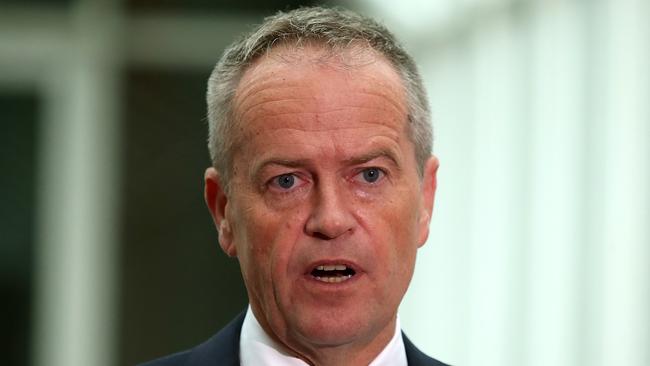Labor puts journalists first over national security
Bill Shorten says he would vote down laws to curb foreign interference unless they ensure journalists could not be jailed.

Labor has split with the government on national security, with Bill Shorten declaring he would vote down laws to curb foreign interference unless they were changed to ensure journalists could not be locked-up “simply for doing their jobs”.
Attorney-General Christian Porter is looking at improvements to the bill and is consulting with media companies, including News Corp Australia, publisher of The Australian, which was a signatory to a joint submission raising concerns about the overhaul and the unintended consequences on journalists.
Mr Porter has softened his initial resistance to changes and is now conceding it was “inevitable that there will be amendments and refinements to some of the drafting”, which is “largely to do with the tightening of the drafting to provide certainty, particularly for journalists”.
The Opposition Leader yesterday raised the pressure on the government to produce amendments to the reforms, saying freedom of the press was “paramount in our democracy”.
“If these laws don’t adequately protect journalists doing their job, the government needs to fix its mistakes,” he said. “I won’t support laws that see journalists imprisoned simply for doing their jobs.”
Mr Shorten said Labor would always support practical measures to strengthen national security, but warned that the government’s proposal was flawed.
“We have to get the balance right and that includes ensuring we have a strong media,” he said.
“I’m not sure if this is sloppy drafting or deliberately designed by the government to curtail media freedom.”
Labor identified other concerns with the overhaul, including whether charities would need to be registered as foreign agents and if whistleblowers would be deterred from reporting misconduct to the Inspector-General of Intelligence and Security.
Opposition legal affairs spokesman Mark Dreyfus told ABC radio the reforms were an “extraordinary overreach by the government … They’ve cast a much, much wider net than is necessary and the defences that have been provided are inadequate. And that’s what media organisations across the country are concerned about. What this bill amounts to is criminalising journalists going about their ordinary work,” he said.
The Australian understands the government may in the next few days identify some areas where improvements can be made.
In a submission to the parliamentary joint committee on intelligence and security, a range of media companies — including the ABC and Fairfax — warned that journalists and editorial staff could be jailed for up to 15 years for receiving classified information, even before publishing it.
“The proposed legislation criminalises all steps of news reporting, from gathering and researching of information to publication/communication,” it said. “We recommend a general public interest/news reporting defence be available for all relevant provisions in both the secrecy and espionage elements of the bill.”


